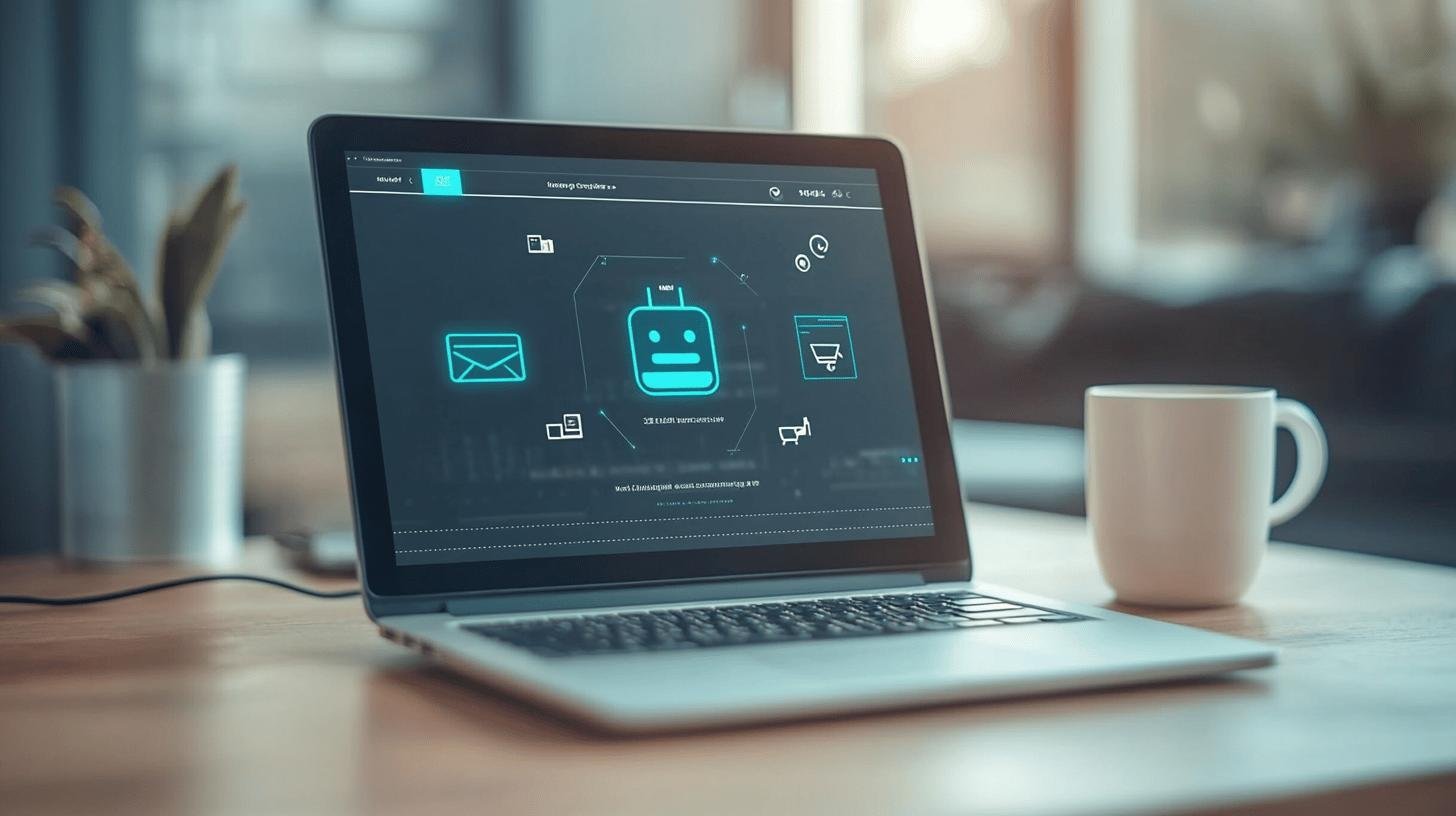What if I told you AI chatbots could increase your e-commerce sales by 67%? Surprising, right? It’s happening! Chatbots are no longer just a fancy feature—they’re game-changers for online stores. From reducing cart abandonment to improving customer engagement, they streamline the shopping experience and drive conversions. Ready to see how AI chatbots can revolutionize your e-commerce strategy? Let’s explore the powerful benefits and why they’re becoming essential tools. You won’t want to miss out!
Benefits of AI Chatbots for E-commerce
Deploying AI chatbots can boost your e-commerce game significantly. They improve the customer experience by providing quick and accurate responses. Happy customers are more likely to buy, which explains why stores see a 67% increase in sales after implementing chatbots.
AI chatbots also reduce the rate at which carts are abandoned. It’s frustrating when customers leave items in their cart and ignore the purchase. Chatbots help by reminding customers of their pending purchases and offering assistance or incentives to complete the transaction. Cart abandonment rates are near 70%, costing stores billions annually.
Key Benefits of AI Chatbots:
- 24/7 Availability: Chatbots never sleep, offering customer support around the clock.
- Instant Responses: Customers get immediate answers, reducing wait times.
- Personalized Shopping: Chatbots recommend products based on customer preferences.
- Cost-effective: Reduces the need for a large customer support team, saving money.
- Scalability: Handle multiple queries at once, ensuring no customer is left waiting.
When chatbots address customer questions quickly, it leads to better engagement and satisfaction. Imagine a customer browsing your online store at 2 AM; a chatbot is there to assist, making the shopping experience smooth and enjoyable. This keeps customers coming back, turning one-time buyers into loyal customers.
Top AI Chatbot Solutions for E-commerce

Choosing the right AI chatbot can make a huge difference in your e-commerce game. A good chatbot boosts customer engagement and streamlines your support system. Let’s see some of the top options out there.
1. Watermelon
Watermelon stands out because it integrates with GPT-4, one of the most advanced AI models. This chatbot can automate up to 96% of support inquiries. Imagine not having to manually handle almost all customer questions—that’s a massive time-saver!
2. Giosg
Giosg is another popular choice, serving over 1,200 companies worldwide. Its strength lies in combining live chat with AI. You get the best of both worlds: real-time human interaction when necessary and automated responses for easier questions.
3. Chatfuel
If you’re looking for something simple and effective, Chatfuel is your go-to. It’s a no-code builder, perfect for creating chatbots for Facebook Messenger. You don’t need any coding skills, making it super accessible for small businesses.
4. Flow XO
Flow XO is all about versatility and affordability. For just $25 a month, you can create chatbots that fit various business needs. Whether you need it for customer support, lead generation, or even simple FAQs, Flow XO has got you covered.
5. ManyChat
ManyChat excels in automating interactions across multiple platforms, including Facebook Messenger, SMS, and email. It’s great for running promotions and keeping your audience engaged across different channels.
Implementing AI Chatbots in E-commerce
Getting an AI chatbot up and running in your e-commerce store can be a game-changer. The key is to implement it seamlessly for optimal performance. A well-integrated chatbot can interact with customers conversationally, making their shopping experience smoother and more enjoyable.
Integrating a chatbot like ChatGPT into your e-commerce platform involves adding specific scripts to your website’s code. This allows the chatbot to detect clicks and provide personalized responses. It’s like giving your website a smart assistant that’s always ready to help.
Steps to Implement AI Chatbots:
- Choose Your Chatbot Platform: Pick a chatbot that fits your business needs.
- Add Scripts to Your Website: Integrate the chatbot by adding the necessary code.
- Train Your Chatbot: Feed it with FAQs and common customer queries.
- Set Up Triggers: Define what actions will prompt the chatbot to engage.
- Test the Chatbot: Run tests to ensure it provides accurate responses.
- Deploy and Monitor: Launch the chatbot and monitor its performance.
Post-implementation, it’s crucial to monitor your chatbot’s performance. Track metrics like response accuracy, customer satisfaction, and engagement rates. Make adjustments based on this data to improve the chatbot’s effectiveness continuously. This keeps your chatbot sharp and ensures your customers get the best experience.
Best Practices for AI Chatbots in E-commerce

To get the most out of your AI chatbots, following best practices is crucial. Think of it like baking a cake—you need the right ingredients and steps to get the perfect result. Best practices ensure that your chatbot performs optimally, making your customers happy and boosting your sales.
Best Practices:
- Promote Clear Communication: Make sure your chatbot is easy to understand and provides straightforward answers.
- Humanize Interactions: Add a touch of personality to your chatbot. Use friendly language so customers feel like they’re chatting with a real person.
- Personalize customer experiences: tailor responses based on customer data. Personalization can make a huge difference in customer satisfaction.
- Keep Bots Updated: Regularly update your chatbot’s database to include new FAQs and improve its responses.
- Use for More Than Support: Employ your chatbot for lead generation, sales, and gathering customer feedback, not just answering questions.
Take a look at Sephora and H&M as examples of successful chatbot implementations. Sephora’s chatbot helps customers find the right products by asking a series of questions. This personalized approach increases customer satisfaction and boosts sales. H&M’s chatbot offers style recommendations, making the shopping experience interactive and fun.
Measuring ROI of AI Chatbots in E-commerce
Measuring the ROI of AI chatbots in e-commerce is crucial. It helps you understand the value they bring to your business. By tracking ROI, you can see how these chatbots improve sales, customer service, and overall efficiency. This data justifies the investment and helps make informed decisions about future chatbot enhancements.
Key Metrics:
- Conversion Rate: Track how many visitors turn into buyers after interacting with the chatbot.
- Customer Satisfaction: Measure how happy customers are with the chatbot’s responses.
- Time Saved: It calculates the amount of time saved by the team thanks to the chatbot handling common questions.
- Cost Savings: Determine the reduction in customer support costs due to automation.
Deploying chatbots can increase sales by an average of 67%, which is a huge boost. They also save up to 70% of a team’s time by handling repetitive tasks. Performance monitoring tools can track these metrics, showing how chatbots enhance team efficiency and customer satisfaction. This improves operational efficiency and boosts your bottom line.
Future Trends in AI Chatbots for E-commerce

AI chatbot technology is constantly advancing, and it’s exciting to see what’s coming next. Future trends include voice-enabled AI chatbots, which will allow customers to interact using their voices, making the experience even more natural. Multi-tasking capabilities are also on the horizon, enabling chatbots to handle multiple customer interactions at once, making them more efficient.
Upcoming Trends:
- Voice-Enabled Chatbots: Customers can use voice commands to interact with chatbots.
- Advanced Natural Language Processing (NLP): Chatbots will understand and respond more human-like.
- Multi-Tasking Capabilities: Chatbots will manage multiple queries simultaneously.
- Integration with Social Media: Chatbots will seamlessly work with platforms like Facebook and Instagram.
- Mobile Commerce Integration: Enhanced functionalities for mobile shopping experiences.
These trends are expected to have an impact on e-commerce. Voice-enabled chatbots and advanced NLP will make interactions more perceptive, reducing friction in the customer journey. Integration with social media and mobile commerce means that customers can shop and get support wherever they are, making the entire shopping experience more cohesive and enjoyable. These advancements will make chatbots an even more integral part of e-commerce, driving sales and improving customer satisfaction.
Conclusion
Investigating AI chatbots for e-commerce has shown several benefits, as these instruments provide quantifiable effects. Notably, they can dramatically lower cart abandonment, increase customer happiness and engagement, and increase sales by as much as 67%.
Leading chatbots such as ManyChat and Watermelon facilitate a smooth integration procedure, allowing organizations to easily implement this technology. It is imperative that they adhere to best practices in order to optimize their efficacy and achieve the greatest possible outcomes.
Furthermore, monitoring ROI offers lucid insights into how chatbots are propelling business expansion, and forthcoming trends suggest even more fascinating advancements that will persist in transforming the e-commerce terrain.
FAQ
How can AI chatbots assist in reducing product return rates in e-commerce?
AI chatbots can help minimize product returns by offering personalized product recommendations based on customer preferences, answering detailed questions about products, and providing accurate sizing or usage information. They can also guide customers through troubleshooting steps or post-purchase support, helping to resolve issues that might otherwise lead to a return.
Can chatbots be used for e-commerce?
Chatbots can be used for e-commerce. They handle customer inquiries, recommend products, and assist with purchases, improving the user experience and boosting sales.
What is the best AI bot for e-commerce?
The best AI bot for e-commerce depends on your needs. Popular options include Watermelon, Giosg, Chatfuel, Flow XO, and ManyChat.
How can AI be used in e-commerce?
AI can be used in e-commerce to improve customer support, recommend products, handle transactions, and analyze customer behavior for better marketing.
How do I create an e-commerce chatbot?
To create an e-commerce chatbot, you’ll need to select a chatbot platform, design conversational scripts, integrate with your e-commerce system, test thoroughly, and deploy it for customer use.




